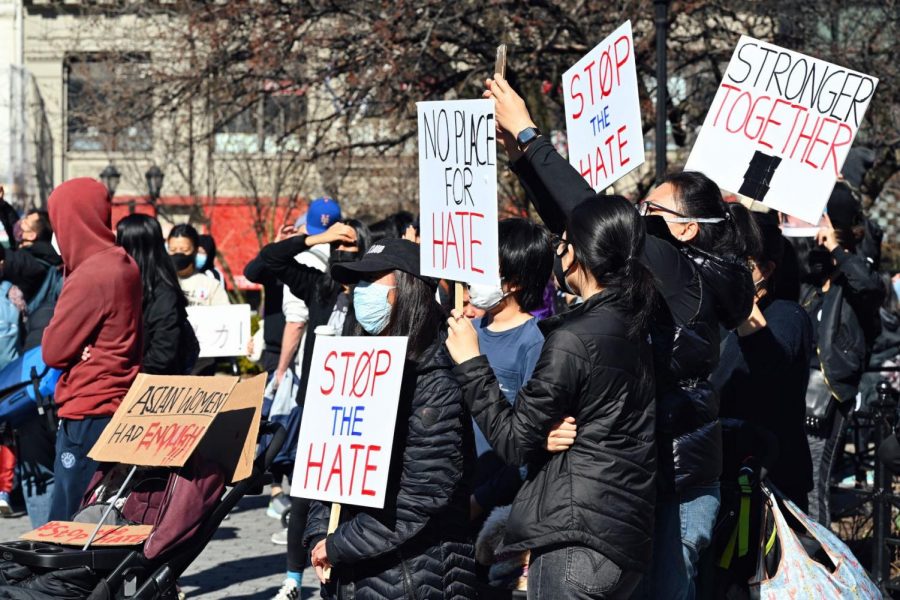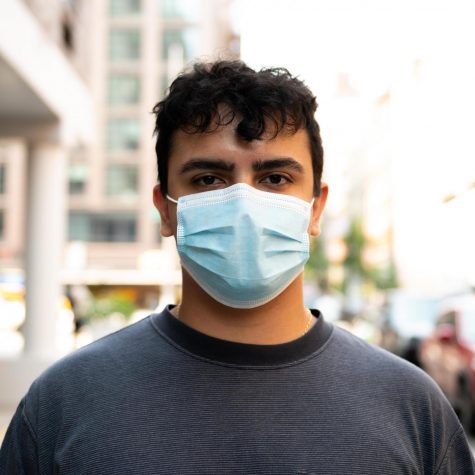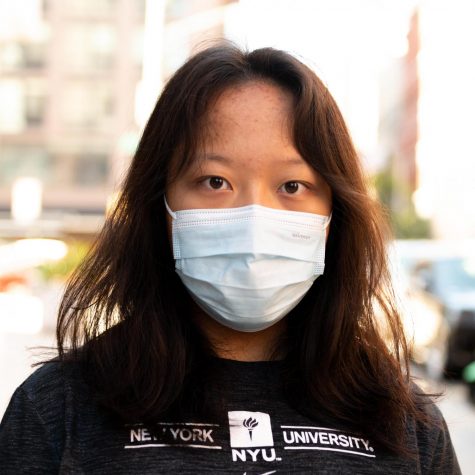NYU Politics professor denies anti-Asian sentiment then asks for retraction
For the second time in a year, a professor at NYU’s Politics Department expressed unsubstantiated beliefs about race in America. Now he’s requesting a retraction.
AAPI members are protesting in New York City in response to an increase in acts of hate against Asian Americans. Recent comments by a professor at the NYU Wilf Family Department of Politics have been characterized as misleading and as seemingly in conflict with the administration’s stance on anti-Asian hate. (Photo by Sirui Wu)
April 26, 2021
NYU politics and economics professor David Denoon was quoted in the weekly business publication Nikkei Asia earlier this month. After saying that he does not believe “widespread anti-Asian sentiment” exists in the United States, he has since claimed he was misquoted and misrepresented.
“I do not believe there is widespread anti-Asian sentiment in the U.S.,” Denoon is quoted as saying. “The competence and industriousness of many ethnic Asians is frequently admired.”
“Claims of widespread anti-[Asian] sentiment in the U.S. are either misinformed or attempts to create ethnic friction,” he continued. “Just because a small minority of Americans make claims about anti-Asian sentiment, and these are repeated by senior Chinese government leaders, does not make these claims balanced or accurate statements.”
In his written statement sent to WSN, Denoon confirmed he told Nikkei Asia staff writer Marrian Zhou on March 29 he did not believe in the existence of widespread anti-Asian sentiment in the U.S. He claimed that Asian Americans and Asian immigrants earn more money and score higher on standardized tests than average Americans as evidence for his belief. This is important, Denoon continued, because it means that Asians in the United States have access to high-status education and high-paying jobs.
Yet, Denoon has since accused Zhou, who co-wrote the article, of misquoting and misrepresenting him.
“Ms. Zhou of Nikkei Asia did more than misquote me; she completely fabricated a sentence which made me appear to be inattentive to the issues you raise,” Denoon wrote to WSN in an email.
Christopher Grimes, the executive editor of Nikkei Asia, claimed the quotes are entirely accurate.
“The quotes are verbatim,” Grimes told WSN. “We stand by these quotes, and feel strongly that we’ve accurately reflected the professor’s sentiment here.”
Denoon did not point out any specific quotes as incorrectly printed, instead focusing on paraphrasing by the reporters amid extensive quotes. In a written statement sent to WSN, Denoon said he had asked for a retraction, but Zhou refused.
“Journalists have no right to substitute their own wording and leave readers with the impression they are providing direct quotes,” Denoon wrote in a second email to WSN.
Nikkei Asia has not released a copy of the interview with Denoon, and would not share a copy with WSN citing source confidentiality, but said the quotes were sent by Denoon via email on March 29 — approximately two weeks after the Atlanta shooting that killed eight people, six of them Asian women. Denoon has also not released a copy of the email and would not share a copy with WSN either.
The shooting rampage by a young white man in Atlanta last month targeted women from working-class Asian immigrant backgrounds who worked in the stigmatized Asian American massage industry.
On April 15, another young white male gunman opened fire at a FedEx warehouse in Indianapolis, Indiana, killing eight people, four of them members of the local Sikh community. A statement signed by eight local gurdwaras, Sikh houses of worship, said that “the FedEx facility he targeted was well known for having a large Sikh workforce.” The attack is considered by some to be the latest in a long line of anti-Sikh hate crimes dating back to the immediate post-9/11 period.
The nonprofit Stop AAPI Hate received almost 3,800 reports of verbal attacks, online harassment, civil rights violations and physical assaults against Asian Americans between March 2020 and February 2021. The cases span all 50 U.S. states and the District of Columbia.
The nearly 200-year history of Asian people in America has been marked by marginalization, internment, nativist violence and state-sanctioned racial discrimination. The number of anti-Asian hate crimes across the country increased by nearly 150% during the COVID-19 pandemic, according to an analysis of police data conducted by the Center for the Study of Hate and Extremism at California State University at San Bernardino.
Asian Americans experience income inequality more than any other racial group — despite having the highest median household income among racial groups in the United States. From 1970 to 1998, the overall national rise in income inequality was most drastic among Asian Americans, and the income of Asians in the bottom 10% increased the least of any racial group during that same period.
Additionally, while Asian American students tend to outperform other groups when it comes to standardized testing, education experts point out that Asian American students — particularly Chinese and Korean Americans — are also more likely than others to participate in test prep, are singled out for advertising and recruitment by test prep companies, and tend to have access to higher-quality education than their Black and Hispanic counterparts.
In addition to being at odds with the data on racial discrimination and violence against Asian Americans, Denoon’s disbelief in anti-Asian sentiment clashes with the stated views of the NYU administration, which has condemned the national surge in anti-Asian hate on multiple occasions.
“The current trend of anti-Asian racism has deeply rooted historic legacies that also must be addressed to realize equity in our institution and global communities,” Dr. Lisa Coleman, senior vice president of Global Inclusion & Strategic Innovation at NYU, wrote in a March email to WSN.
NYU faculty experts on race and ethnicity squarely denounced Denoon’s words as printed in Nikkei.
“It’s unsettling … that somebody who not only is a professor at NYU, but who runs the Center on U.S.-China Relations, seems so uninformed about the politics of anti-Asian violence,” said a professor and member of Faculty of Color for an Anti-Racist NYU who preferred not to be named. “This has been discussed at the highest levels of government. Joe Biden, the president of the United States, has spoken out against the rise in anti-Asian violence.”
Following the Atlanta shootings, Biden responded to the rise in anti-Asian violence with multiple speeches and executive actions. Japanese American Senator Mazie Hirono, D-Hawaii, the first Asian American woman elected to the Senate, introduced a bill last month calling for the Department of Justice to expedite its review of “reports of COVID-19 hate crimes.” On April 23, the bill passed almost unanimously, with a single “no” vote from Missouri Sen. Josh Hawley.
“The retrograde quote by Professor Denoon is obviously insulting to NYU’s Asian American community, and to the Asian American community at large,” said Paula Chakravartty, an affiliated faculty member at NYU’s Asian/Pacific/American Institute.
Crystal Parikh, who directs the A/P/A Institute, also expressed disagreement with the quotes.
“I think it’s unfortunate that he chose to comment at all on this topic of which he has no scholarly knowledge,” Parikh said. “I’m especially saddened to read this from a colleague at NYU when … I’m hearing from folks directly about how they are worried about riding the subway, or just being out during the day. It’s not just that it’s uninformed and misrepresenting the situation, but it also flies in the face of the experience of the very community at NYU of Asian/Pacific/Americans.”
Last month, the A/P/A Institute released an open statement on anti-Asian violence, expressing horror at the Atlanta shooting and saying “Anti-Asian racism takes many forms, including interpersonal violence, government neglect, harassment, hate speech, insecure and underpaid labor, and mass deportations.” At press time, the A/P/A statement has been signed by 114 students and faculty.
The A/P/A statement also called on NYU to join efforts calling on Biden to end the Department of Justice’s “China Initiative,” a prosecution effort aimed at what it deems “Chinese national security threats.”
Denoon has served in the U.S. federal government three times — for the Department of Defense, the Export-Import Bank and the Agency for International Development. Denoon is currently the director of NYU’s Center on U.S.-China Relations. He has written books on geopolitics in China and is cited as an expert on American foreign policy in Asia. None of his published scholarship focuses on race in America or Asian American history.
“People can say what they want — it’s not a free speech issue here,” Chakravartty said. “It’s about the fact that NYU is being represented by faculty who are making these … discredited, retrograde types of arguments.”
Neither of Denoon’s beliefs on income and standardized exam trends apply to the entire Asian American population — a racially and ethnically diverse population, consisting of both long-established generational communities and newer immigrant communities.
“Reading the statement that Professor Denoon makes leads to immediate recognition of a kind of textbook anti-Black racism, of wedging Asians as good test-takers, and the model minority, pitted against Black and Latinx communities,” Chakravartty said.
Scholars of race say Asian Americans have long been defined by the model minority stereotype, which stereotypes Asians as uniquely hardworking, smart, assimilable and docile (particularly as a false contrast to Black Americans).
However, Asian Americans have wide variation in socioeconomic status, affecting both income and education. Some Asian Americans and Pacific Islanders have higher poverty rates, lower median household incomes and less access to good education than their white counterparts — in particular, Bangladeshi, Burmese, Hmong, Bhutanese, Samoan and Nepali Americans. AAPI women earn significantly less on average than their white male counterparts — especially Samoan, Burmese, Nepali, Hmong and Cambodian women, who all earn less than 61 cents to every dollar made by a white man in the United States.
“The sort of model minority stereotype, the invocation of accomplishments on the part of Asian Americans … as if those somehow protect a large and heterogeneous population from various forms of racism and violence, as if test scores will protect you from that, seems absurd to me, and incredibly uninformed,” Parikh said.
Denoon’s comments are the second time in less than a year that a professor at NYU’s politics department has publicly expressed misleading and unsubstantiated beliefs about race in the United States. In July 2020, Lawrence Mead published a racist screed in the journal Society titled “Poverty and Culture.”
“The seriously poor [in America] are mostly blacks and Hispanics, and the main reason is cultural difference,” Mead wrote in the paper. “The great fact is that these groups did not come from Europe. Fifty years after civil rights, their main problem is no longer racial discrimination by other people but rather that they face an individualist culture that they are unprepared for. Their native stance toward life is much more passive than the American norm.”
The paper was later retracted by the journal amid outrage at NYU and beyond, with hundreds of scholars joining various open letters slamming Mead’s article as “overtly racist,” “dehumanizing,” “outdated,” “odious,” “irresponsible” and “unscholarly.”
NYU published a news release from CAS faculty and Wagner leadership the same month defending Mead’s “rights to freedom of expression” while condemning “the article’s false, prejudicial, and stigmatizing assertions about the culture of communities of color in the United States.”
“The fact that most students at NYU can recognize these long-discredited ideas that are still being advocated by members of NYU’s faculty speaks very urgently to the need for departments like Politics, and others at the university that have abysmal records when it comes to faculty of color from underrepresented groups, to hire faculty of color,” Chakravartty said.
Last summer, an open letter drafted by Faculty of Color for an Anti-Racist NYU in response to Mead’s paper called on NYU to authorize a “cluster hire in Black politics in the Politics Department.”
“Students entering the Wilf Family Department of Politics need access to a diverse faculty whose approach to the field of Black politics is characterized by depth and rigor,” the letter reads. “Our students also need and deserve spaces characterized by respect, a sense of trust and belonging so that they feel heard and respected, and can grow and thrive intellectually regardless of their background.”
More than 200 scholars affiliated with NYU signed the letter. Politics professor Christine Harrington, who signed the letter, said she has long supported calls to diversify the politics department in terms of race, gender and research interests.
“To be a good department, you [need] a lot of intellectual, cultural, gender, racial diversity that captures stuff going on in the discipline, in social sciences,” Harrington said.
“Having faculty in a department like Politics who are making the kinds of arguments that Professor Mead or Professor Denoon are making, without a counterpoint, is really troubling,” Chakravartty said. “Troubling from a pedagogic perspective, troubling in terms of student mentorship.”
A version of this article appeared in the Monday, April 26, 2021, e-print edition. Email Suhail Gharaibeh at [email protected].



























































































































































deja merald • Apr 29, 2021 at 5:48 pm
Its a real miracle Till today i still imagine how dr 0love brought back my man after he had vowed never to set his eyes on me again. he had even set the date for his wedding with another woman before i contacted dr 0love.
He told me to leave everything to him because i told him if the wedding takes place i would commit suicide.
After he cast the spell for me my man came back to me and said he wants to still marry on that date and the woman he wants is me and am so happy to announce that our wedding is coming up in 2 weeks time and i am still in contact with dr 0love till date because he is a very powerful man and a man to be trusted. CONTACT DR 0LOVE ON email: doctor0lovespell @ gmail. com OR whatsapp him on: +1 (201) 781-2375 You can also visit his FB page: https://www.facebook.com/Lovespellthatworkfastusa or view his website: ttps://doctor0lovespell.wordpress.com/